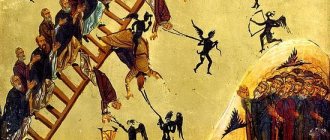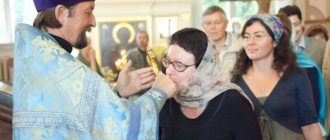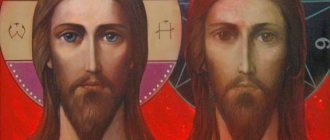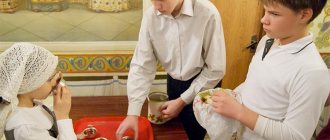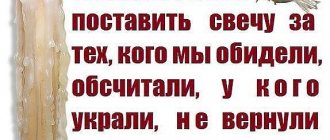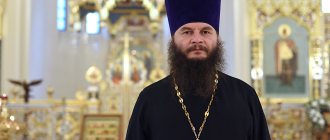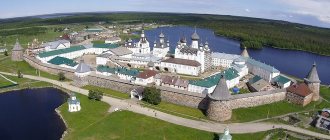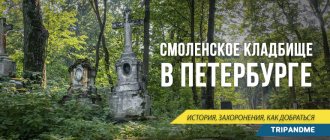Vadim Leonov is an archpriest of the Russian Orthodox Church. His biography tells us that Vadim was born on December 27, 1996.
Vadim Leonov has written a lot of lectures, as well as several famous books
Born in the city of Sverdlovsk, Voroshilovgrad region, into a good Orthodox family.
In 1993, he completed his studies at the Budapest Technical University, and then at the Moscow Machine Tool Institute.
Afterwards, in 1993, he entered the Moscow Theological Seminary, from which he graduated in 1996.
Afterwards he entered the Moscow Theological Academy, graduating in July 2000. In it he defended his candidate’s work on the topic: “Patristic teaching on the human nature of our Lord Jesus Christ.”
Afterwards, in 1996, he was ordained to the rank of deacon. And already on October 12, 1997, he was ordained to the priesthood.
Since August 2000, he has served as a full-time priest of the Church of the Holy Martyrs and Passion-Bearers Boris and Gleb in Degunino, Moscow. Serves there until January 2003.
The Church of the Holy Martyrs and Passion-Bearers Boris and Gleb in Degunino is currently operating. Divine services are held there daily. It was here that Vadim Leonov served as a full-time priest
After the decree of the Patriarch of Moscow and All Rus' Alexy II, Vadim was appointed full-time priest of the Church of the Holy Great Martyr Catherine in Vspolye.
On March 31, 2010, Vadim Leonov was elevated to the rank of archpriest. And since November 2010, he has been appointed full-time clergyman of the Patriarchal parishes in Zaryadye.
Lectures by Archpriest Vadim Leonov have become quite popular
Now Vadim Leonov's lectures have become very popular. Lectures are videotaped. Each lecture is devoted to very difficult and complex issues. Let's look at what some of these lectures are about.
For example, lecture No. 17 is called “The Image of God in Man.” This lecture is devoted to the Orthodox teaching about the essence of man’s Godlikeness, as well as about the manifestation of the image of God in man.
Such concepts as personality and freedom are considered. This lecture can be viewed on video.
A lot of believers gather at the lecture to listen to the words of the priest. After the lectures, Father Vadim answers all questions from those gathered.
Lecture No. 12 is called “Creation of the World” and is devoted to the Orthodox teaching about the creation of the world, as well as non-Christian cosmogonies.
After discussing the topic, Father Vadim answers questions from all those present. This lecture can be watched and listened to on video.
Lecture No. 22 “Who is Jesus Christ?” The lecture is devoted to the teaching of who Jesus Christ is and why he is the perfect God and man.
How the Divine and human natures were united in Him. The lecture can be watched on video.
All lectures by Father Vadim can be viewed on a special channel on YouTube.
Publications
monographs
- God in the flesh: Patristic teaching on the human nature of our Lord Jesus Christ. - M.: Drakkar, 2005. - 215 p. God in the flesh. Patristic teaching about the human nature of our Lord Jesus Christ. - Sergiev Posad: STSL, 2015. - 240 p.
- Fundamentals of Orthodox anthropology: textbook. — 2nd ed., rev. and additional - Moscow: Publishing house of the Moscow Patriarchate of the Russian Orthodox Church, 2016. - 455 p. — ISBN 978-5-88017-351-8.
academic articles and journalism
- Ecumenical councils of the Orthodox Church on the human nature of the Savior // Annual Theological Conference of the Orthodox St. Tikhon’s Theological Institute: Materials of 2003. M.: PSTBI Publishing House, 2003. - pp. 31-42.
- On the day of memory of the Holy Great Martyr Catherine // Orthodox newspaper. Ekaterinburg. 2004. - No. 45 (318) dated December 1, 2004.
- Holy Righteous John of Kronstadt, speaking about prayer, said that uncertainty in receiving what is asked is blasphemy against God, how is this to be understood? // pravoslavie.ru, December 8, 2004.
- Eucharistic Docetism // Church and Time. 2005. - No. 2 (31). — P. 78—105.
- Anthropological ideal of perfection // Bulletin of PSTGU. Series IV: “Pedagogy. Psychology". PSTGU Publishing House. M., 2006. - Issue. 2. - pp. 81-92.
- About faith and unbelief in the sacrament of the Eucharist // Holy Fire. 2006. - No. 14. - P. 64-93.
- Afterword to the academic seminar “Holy Gifts in the Sacrament of the Eucharist” // Holy Fire. 2006. - No. 15. - P. 101-106.
- Review of the book by V. N. Dukhanin “The Hidden World of Orthodoxy” // Journal of the Moscow Patriarchate. 2006. - No. 4. - P. 75.
- The relationship between the concepts of “personality” and “image of God” in Orthodox theology // Patristic psychology. Scientific reports and speeches. Proceedings of the conference of the XVI International Christmas educational readings. M., 2008. - P. 66-73. The relationship between the concepts of “personality” and “image of God” in Orthodox theology // Sretensky collection. Scientific works of SDS teachers. - M., 2010. - P. 72-83.
editing and compilation
- All-Holy: Orthodox dogmatic teaching on the veneration of the Mother of God. Collection of works / Enter. article, compilation and general editing of the sacred. V. Leonova. M.: Pilgrim Publishing House, 2001. - 256 p.
- The Greatness of the Most Pure Virgin Mary / Enter. article and general editorship of the priest. V. Leonova. M.: Pilgrim Publishing House, 2005. - 335 p.
- Fundamentals of Orthodox anthropology: a reader / [comp. and general ed. Leonov Vadim, archpriest]. - Moscow: Publishing House of the Moscow Patriarchate of the Russian Orthodox Church, 2016. - 686 p. — ISBN 978-5-88017-535-2.
original educational video courses
- Dogmatic theology. 12 lectures. YouTube channel PravoslavieRu. 2014-2015
- Christian anthropology. 2 lectures. YouTube channel PravoslavieRu. 2016
- Symbol of faith. 12 lectures. YouTube channel PravoslavieRu. 2018
- https://www.youtube.com/watch?v=hcOi9uTSmeI&t=4099s Passions and virtues. 2 lectures. YouTube channel PravoslavieRu. 2022
interview
- Confession and Communion - together or apart? // Holy Fire. 2007. - No. 17. - P. 3-9. Confession and Communion: together or apart? // Moscow: magazine. 2008. - No. 8. - P. 235-240.
Vadim Leonov also wrote books - one of the most famous is “Fundamentals of Orthodox Anthropology”
Father Vadim wrote several books. One of the most famous is “Fundamentals of Orthodox Anthropology.”
Buy a book on the Sretenie.ru website
The book is a unique experience in presenting the Orthodox teaching about man on the basis of Holy Scripture. The book was published in 2013
The book examines a basic range of anthropological topics and provides theological justification for the key anthropological ideas of Orthodoxy. Having conceived the book as a textbook on Orthodox anthropology, Father Vadim wrote it in such a way that it would be understandable and useful to any reader.
Orthodox anthropology is a teaching about man based on Holy Scripture and Holy Tradition
Thus, this work is addressed both to theologians, anthropologists, psychologists, teachers, students of theological educational institutions, and to everyone who would like to get closer to the secrets of human existence and use divine Revelation to transform their soul.
Father Vadim answers about his book in one of his interviews. Anthropology had only just begun to be introduced into the seminary curriculum.
The basis of the book is made up of notes from the Holy Scriptures - Divine Revelation
They ask the priest on what basis his famous book was written. He answers that the basis, of course, comes from Holy Scripture:
“First of all, of course, Holy Scripture. In general - Divine Revelation. Divine Revelation is revealed to us, in addition to the Holy Scriptures, also in the decrees of the Ecumenical Councils, which spoke truths by the Holy Spirit, in the works of the Holy Fathers, especially if there is a so-called consensus partum on any issue.
To summarize, we can say that we draw anthropological knowledge from the Holy Tradition of the Orthodox Church. And Sacred Tradition is the experience of life in the Holy Spirit, preserved and passed on in the Church from generation to generation.”
And the priest also answers whether young priests should study this course and what is its relevance:
“Every shepherd leads people to God, so he also needs to know who God is and what the path to Him is.
And also understand that he leads a person along this path. The main thing is that this path is correct.
At the same time, one must know a person as God created him, namely pure, ideal, and in the state in which he is - with his sins and passions.
A shepherd who does not know what a person should be and how he can change for the better, most likely will not be able to change or contribute to the spiritual transformation of his flock.
That is why studying Christian anthropology is not only necessary, but also necessary for pastoral ministry.
Father Vadim says about the purpose of anthropology that it is too simple, but important. It is necessary to systematically present about the revealed teaching, about nature, about the personality of existence itself.
Unfortunately, this goal has not been achieved, because in many patristic writings knowledge about man is presented completely unsystematically.
People who do not have a theological education at all, when reading theological literature, will find it very difficult to form a holistic idea of who and what a person is, what and why he is destined for, how he can become better than he is now.”
Vadim Leonov
archpriest
You can study the book in more detail either at an Orthodox bookstore, or.
By leaving a comment, you accept the user agreement
Biography
Vadim Leonov was born on December 27, 1966 in the city of Sverdlovsk in the Voroshilovgrad region. The father and mother were deeply religious people, which was reflected in their son. Already from childhood, the boy was taught the love of God.
Archpriest Vadim Leonov
Little is known about Vadim's childhood. In 1993, he completed his studies at the Budapest Technical University. That same year, the young man became a student at the theological seminary, from which he graduated in 1996. The same year was marked by another happy event. Vadim Leonov was ordained to the rank of deacon, and a year later to the rank of priest.
Until the end of the 20th century, studies continued at the Theological Academy in Moscow. Since the last month of summer 2000, Vadim began to serve as a priest in the Church of the Blessed Martyrs Boris and Gleb in the capital. In 2003, by decrees of Patriarch Leonov, it was transferred to the Church of the Great Martyr Catherine
In 2010, Father Vadim was granted the rank of archpriest. To this day, the priest continues to serve before the Lord.
Interpretation by the teacher, some comments on the results of the work
Father Vadim Leonov: – Why are parables remarkable? They allow for a variety of interpretations. If your interpretation differs from what I now voice or what someone else has suggested, this does not mean that you, I, or he are wrong. Most likely, both you and those who offered their interpretations will be right. The more interesting it is to compare!
I am amazed at the variety of answers you have offered. As we initially agreed: all answers are correct! By the way, it is very interesting to see another person through the prism of the parable he is interpreting. In fact, parables help each of us to know not only something external, but also to know ourselves.
Because in the interpretation of the parable, we ourselves, perhaps without realizing it, always invest something that is most important for ourselves. We do not take an interpretation from somewhere out of nothingness, we draw it from the experience of our own soul and, as if on an X-ray, we illuminate it with the images of a parable.
A parable is a mirror. We can, on the one hand, know ourselves, and on the other hand, based on your interpretations, the teacher can know you.
After reading your answers, I will offer my interpretation. In this parable, the person who lit the candle is our Lord Jesus Christ. The candle is the Church with its grace of the sacraments.
The first person who was able to light his candle from it was the one who was a member of the Church, who participates in the sacraments of the Church. When the heart goes out - and it goes out for us, and quite often, from a lack of love, from vanity, from our personal sins - a church-going Christian has the opportunity to ignite his heart again with love, virtue, grace, bringing him closer to this candle - the Church. Thus, a believing, church-going Christian becomes a burning lamp. “You are the light of the world” (Matthew 5:14), said the Lord.
The second person is the one who is baptized, but not churched. He is already in some way involved in the Body of the Church through the Sacrament of Baptism, but does not fully exist in it. Therefore, he feels the warmth of the Church, he is influenced by the prayers of the Church and the people who love him. But he is not transformed under the influence of this light, he himself is not ignited by the spirit.
The third person is the one who recognizes the Gospel, who loves Christianity, at least accepts the moral principles of the New Testament. Focusing on them, he is able to make the right choice in his life. Find his own path, which someday, perhaps, will lead him to the Church. But for now he is still far from the Eucharistic communion of believers. And the fourth person is the one who does not believe in God.
So, this parable describes the different attitudes of people towards God and the Church of Christ. But there is another important meaning in it. Here a very complex topic about the boundaries of the Church is figuratively revealed.
We often hear the question: where are the boundaries of the Church? Within the framework of this parable, it becomes clear that the border is determined by the opportunity to join the flame - to light your own candle from the Church candle. As soon as we retreat to a further distance, we already fall out of this fertile space.
In other words, the border of the Church runs along the border of the Eucharistic Chalice: the one who partakes of the Holy Body and Blood of Christ, lives in the fullness of church sacraments, prayers, and a virtuous Christian life, is a member of the Church in full. All the rest - the second, third, fourth - participants in this parable are removed from God to one degree or another.
Christ in the Temple of Jerusalem. Icon Veliky Novgorod
Parable about new life
The young man decided to pursue asceticism. He retired to the dacha. With the new year, a new life begins! He was greatly inspired by the words of the Lord: “Your heart will rejoice, and no one will take your joy from you” (John 16:22).
Two months pass.
- Lord, why isn’t anything happening? - he turns to Christ. An Angel appears to him: - Go outside.
He went out and looked around: the February sun, white trees covered in frost - beautiful! But cold. All chilled.
Another month passes: again the questioning of the Lord and again the Angel appears.
He goes out into the yard again: the March sun is shining brighter, the snow has turned from white to gray, and in the thawed patches one can see cigarette butts and beer cans - evidence of a past life. He felt ashamed: he removed everything and threw it away. Some more time passes.
- Lord, I still didn’t understand anything! An Angel appears: - Go outside.
Out: spring is already coming into its own. The snow has completely melted, and the ground is all in rubbish. He cleaned everything thoroughly. Soon buds appeared on the trees and the first shoots appeared in the flower beds. This consoled him. But there was still some bewilderment in my soul.
The Angel appears again: “Come out!” I came out, and the trees were already in bloom. - Lord, but this is all independent of my prayer... In mid-June, he somehow went out to the threshold of the house in the middle of the night, looked at the starry sky, and went down into the garden. I picked a cherry, ate a berry... - Lord, now I understand! - he said. Interpret the parable.

